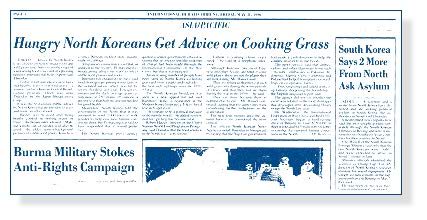International Herald Tribune, Friday, May 31, 1996 (Originally in English) Hungry North Koreans
【TOKYO
】
Advice by North Korea to its citizens on how to make roots and wild grass taste better is another sign of a worsening food crisis and of a pressing need for international help, experts said Thursday.
"Today, I will introduce you to tasty and healthy ways to eat wild grass, a woman said in Korean Central Broadcasting program; which was aired Thursday by the Japan Broadcasting Corp.
It was the first known public advice by North Korea that people turn to grass and roots, an official said.
"Parsley will be good after being briefly cooked in boiling water or fried, the broadcaster advised. "Making kimchi out of parsley will also be good, she added against background pictures of edible wild plants. Kimchi is a spicy Korean pickled dish, usually made of cabbage.
A Japanese commentator said that, in addition to the recipes, Pyongyang was broadcasting advice on ways to select edible wild grasses and roots.
International organizations have said food shortages are getting worse daily in the isolated nation, which was hit by severe flooding last year. Foreign estimates put the daily average grain ration now at 250 grams (9 ounces) a person, less than half the amount needed for good health.
Meanwhile, South Korea told the government of the North that it was prepared to send 7,000 tons of milk powder to help ease near-famine conditions there, but Pyongyang was said to have responded that it would prefer rice.
The South Korean press agency quoted a senior government official as saying that an offer to send the milk free of charge had been made through the International Committee of the Red Cross, but that it was rejected.
An increasing number of people have been seen in North Korea collecting grass and roots at parks and roadsides -- the first such sighting since the 1950-53 war.
The North Korean broadcast was seen as a new appeal for aid, said Kazuhiro Araki, a researcher at the Modern Korea Institute, a Tokyo-based research operation.
"It's meant to be a political message to the outside world, he added, to show that foreign help has become vital.
Robert Hauser, director of the United Nations World Food Program, in Pyongyang, said Thursday that the food situation in the North was "very serious.
"
Famine is coming closer every week, he said in a telephone interview.
Although Koreans, like most Japanese and other Asians, are fond of some wild plants, these are not the plants they are now eating, Mr. Hauser said.
"They are telling us that they eat such wild grass only during the worst periods of crises, and that they last ate them during the war in the 1950s, he said.
"They eat them because there is nothing else to eat, Mr. Hauser continued, adding that the authorities were considering further reductions in the grain ration.
The next four months until the autumn harvest are considered the most critical.
The official North Korean News Agency alluded Thursday to foreign aid by saying that the Nigerian government had made a cash donation to help the country recover from the floods.
The news service said that ambassadors and other diplomats from such "friendly embassies as Pakistan, Indonesia, Algeria, Cuba, Cambodia and Poland had helped transplant rice seedlings on co-operative farms.
"They sang songs and talked with co-op farmers, deepening the friendship, the English-language report said.
The agency did not say whether the event was related to the food shortages that developed after devastating floods swept the North last year.
On Wednesday, the International Federation of Red Cross and Red Crescent Societies began a fund-raising drive in Beijing to raise $750,000 in three weeks and $4.5 million by October to combat the reported famine conditions in the North.
|
|---|
